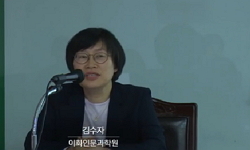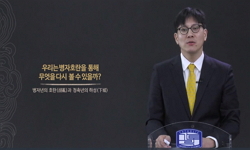The purpose of this study was to analyze the acceptance of Dayi Juemi Lu and the interpretive patterns of the intellectuals of the time in the process of the influx of knowledge and information in late Joseon Dynasty. Dayi Juemi Lu was a book publishe...
http://chineseinput.net/에서 pinyin(병음)방식으로 중국어를 변환할 수 있습니다.
변환된 중국어를 복사하여 사용하시면 됩니다.
- 中文 을 입력하시려면 zhongwen을 입력하시고 space를누르시면됩니다.
- 北京 을 입력하시려면 beijing을 입력하시고 space를 누르시면 됩니다.
조선후기 지식인의 『大義覺迷錄』 수용과 이해 = The acceptance and reception of Dayi Juemi Lu by intellectuals in late Joseon dynasty
한글로보기https://www.riss.kr/link?id=T16807304
- 저자
-
발행사항
서울 : 서울시립대학교 일반대학원, 2023
-
학위논문사항
학위논문(석사) -- 서울시립대학교 일반대학원 , 국사학과 , 2023. 8
-
발행연도
2023
-
작성언어
한국어
- 주제어
-
발행국(도시)
서울
-
형태사항
i, 59 p. ; 26 cm
-
일반주기명
지도교수: 배우성
-
UCI식별코드
I804:11035-000000034712
- 소장기관
-
0
상세조회 -
0
다운로드
부가정보
다국어 초록 (Multilingual Abstract)
The purpose of this study was to analyze the acceptance of Dayi Juemi Lu and the interpretive patterns of the intellectuals of the time in the process of the influx of knowledge and information in late Joseon Dynasty. Dayi Juemi Lu was a book published in order to justify the Qing Dynasty's control over Joseon by criticizing the Hwaigwan system of the ethnic Hans. It was written as a response to the rebellion of Zeng Jing, an intellectual of the Han descent, which occurred in 1728 (the 6th year of the Yongzheng reign). In 1730 (the 8th year of the Yongzheng reign), Dayi Juemi Lu was brought into Joseon by the envoy who visited the Qing Dynasty.
The attention of Joseon's intellectuals towards Dayi Juemi Lu was largely influenced by a figure named Lü Liuliang. Lü Liuliang was an intellectual of the Han descent known for adhering to the loyalty to the Ming Dynasty after the downfall of the Ming Dynasty, without serving under the Qing Dynasty. Intellectuals in late Joseon, who sought to discover aspects related to the loyalty to the Ming Dynasty within the new knowledge and information coming from the Qing Dynasty, paid attention to Lü Liuliang. It was within this context of attention that intellectuals in late Joseon showed interest in Dayi Juemi Lu.
In this regard, the current study examined the perception of Dayi Juemi Lu by Joseon intellectuals from two aspects: royal authority and sovereign-and-subject relations, and loyalty to the Ming Dynasty and Lü Liuliang, focusing on two key figures: Yeongjo and Yi Ik. Yeongjo understood Dayi Juemi Lu in the context of loyalty, which was hugely influenced by the Mushin Rebellion that occurred during the early years of his reign. Yi Ik, on the other hand, read and cited the book in the context of the monarch's Confucian rule. According to him, Dayi Juemi Lu was important evidence that showcased the Qing Dynasty's Confucian rule.
A significant number of readers approached Dayi Juemi Lu from the perspective of loyalty to the Ming Dynasty. Yi Deok-mu and Hong Dae-yong showed interest in Lü Liuliang's background and made efforts to obtain information about him. However, both individuals were ultimately unable to read Dayi Juemi Lu. Therefore, they could only perceive Lü Liuliang as anti-Qing intellectuals emphasizing loyalty to the Ming Dynasty and as prominent figures of the late Ming and early Qing scholars. They concluded that Lü Liuliang symbolized loyalty to the Ming Dynasty.
On the other hand, Han Won-jin and Seong Hae-eung were able to grasp the content of Dayi Juemi Lu. Although they also paid attention to Lü Liuliang's loyalty to the Ming Dynasty, their perception of Lü Liuliang, based on the actual reading the content of Dayi Juemi Lu, had clear differences from that of Yi Deok-mu and Hong Dae-yong. Dayi Juemi Lu contained information that Lü Liuliang lost his integrity by participating in an imperial examination organized by the Qing Dynasty when he was young. Han Won-jin and Seong Hae-eung encountered a problem where their perception of Lü Liuliang's loyalty to the Ming Dynasty conflicted with the content of Dayi Juemi Lu. Ultimately, the solution they chose was to acknowledge the fact that Lü Liuliang lost his integrity but still emphasize him as a symbol of loyalty to the Ming Dynasty. This strategic interpretation was their response to the external variable introduced by Dayi Juemi Lu, which was added to their existing perception.
This study explored the external variable of Dayi Juemi Lu that emerged in the process of Joseon intellectuals accepting new knowledge and information from the Qing Dynasty and how they interpreted it. In doing so, this study elucidated the strategic nature of the interpretation of Dayi Juemi Lu by Joseon intellectuals, which has not been addressed in previous studies. The study shed light on the diverse characteristics of knowledge and information acceptance by Joseon intellectuals in the late period.
국문 초록 (Abstract)
본 연구는 조선후기 지식과 정보의 유입 과정에서 나타난 『大義覺迷錄』의 수용과 당대 지식인의 독해 양상을 분석하였다. 『대의각미록』은 1728년(옹정 6년) 일어난 한족 출신 지식인 曾...
본 연구는 조선후기 지식과 정보의 유입 과정에서 나타난 『大義覺迷錄』의 수용과 당대 지식인의 독해 양상을 분석하였다. 『대의각미록』은 1728년(옹정 6년) 일어난 한족 출신 지식인 曾靜의 역모 사건을 계기로, 옹정제가 한족의 화이관을 논파하고 청의 중원 지배를 정당화하기 위해 간행한 책이다. 1730년(옹정 8년) 편찬된 『대의각미록』은 이듬해 연경을 방문하고 돌아온 사신단에 의해 조선으로 유입되었다.
조선의 지식인들이 『대의각미록』에 주목하게 된 배경에는 呂留良이라는 인물이 있었다. 여유량은 명말청초의 한족 출신 지식인으로, 명이 멸망한 후 청조에 출사하지 않고 대명의리를 지킨 인물로 알려져 있었다. 청으로부터 들어오는 새로운 지식과 정보 속에서 대명의리와 관련된 것들을 찾아내고자 했던 조선후기 지식인에게 여유량은 주목의 대상이 되었다. 그들의 『대의각미록』 독서 또한 그러한 관심의 연장선상에서 이루어졌다.
이에 본 연구는 조선 지식인의 『대의각미록』 인식을 왕정과 군신관계, 그리고 대명의리와 여유량, 이 두 가지 측면으로 구분하여 살펴보고자 한다. 먼저 왕정과 군신관계 측면에서 『대의각미록』을 바라본 인물로는 英祖와 李瀷이 있다. 영조는 『대의각미록』을 충역의 맥락에서 이해하였는데, 그 배경에는 재위 초기 벌어졌던 무신란이 강한 영향을 끼쳤다. 이익은 군주의 유가적 통치라는 맥락에서 책을 읽고 인용하였다. 그의 시선에서 『대의각미록』은 옹정제가 유가적 통치를 펼쳤음을 보여주는 중요한 근거였다.
상당수의 독자는 『대의각미록』을 대명의리의 측면에서 바라보았다. 李德懋와 洪大容은 여유량의 행적에 관심을 가지고, 그에 관한 정보를 얻기 위해 노력했다. 하지만 두 사람은 끝내 『대의각미록』을 읽지 못했다. 따라서 두 사람은 여유량을 대명의리를 밝힌 반청지식인이자 명말·청초 주자학의 대가로 인식할 수밖에 없었다. 그들의 여유량 인식은 대체로 대명의리의 상징으로 귀결되었다.
반면 韓元震과 成海應은 『대의각미록』의 내용을 파악할 수 있었다. 이들 또한 여유량의 대명의리에 주목하였지만, 『대의각미록』의 내용을 접한 두 사람의 여유량 인식은 이덕무·홍대용과 비교했을 때 분명한 차이를 가지고 있었다. 『대의각미록』에는 여유량이 젊은 시절 청조가 주관하는 과거에 응시함으로써 절의를 잃었다는 정보가 담겨 있었다. 한원진과 성해응은 자신들이 기대했던 여유량의 대명의리와 『대의각미록』의 내용이 충돌하는 문제에 봉착하게 되었다. 결국 두 사람이 택한 해결책은 여유량이 절의를 잃었다는 사실을 인정하되, 그가 여전히 대명의리의 표상임을 강조하는 것이었다. 이는 기존의 인식에 가해진 『대의각미록』이라는 외적 변수에 맞선 나름의 전략적 독해였다고 할 수 있을 것이다.
본 연구는 조선후기 지식인이 청으로부터 새로운 지식과 정보를 수용하는 과정에서 나타난 『대의각미록』이라는 외적 변수와, 그것을 독해하는 방식을 검토하였다. 이를 통해 기존 연구가 다루지 않은 조선후기 지식인의 『대의각미록』 독해가 가진 전략적 성격을 규명하였다. 본 연구를 통해 조선후기 지식인의 지식 및 정보 수용이 가진 다양한 성격을 조명할 수 있을 것이다.
목차 (Table of Contents)
- 제1장 서론 1
- 제2장 대의각미록 편찬과 조선 유입 5
- 제1절 증정 역모 사건과 옹정제 5
- 제2절 대의각미록의 조선 유입 사례 13
- 제3장 대의각미록과 조선 독자들의 시야 25
- 제1장 서론 1
- 제2장 대의각미록 편찬과 조선 유입 5
- 제1절 증정 역모 사건과 옹정제 5
- 제2절 대의각미록의 조선 유입 사례 13
- 제3장 대의각미록과 조선 독자들의 시야 25
- 제1절 왕정과 군신관계 25
- 제2절 대명의리와 여유량 인식 31
- 제4장 결론 50
- 참고문헌 53
- Abstract 57












